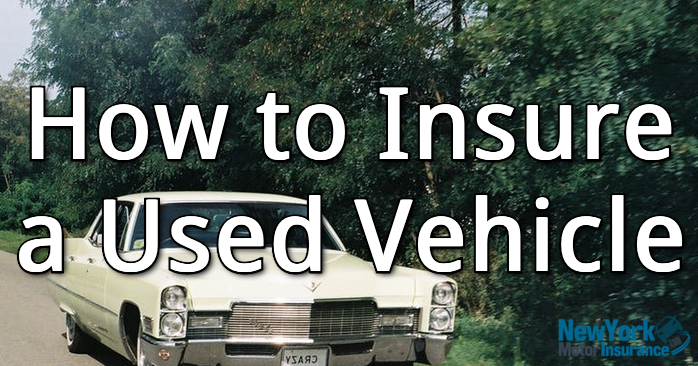How to Insure a Used Vehicle
Last Updated on May 8, 2020
Buying a used vehicle can be an excellent way to save money on your car, especially if you purchase a vehicle that doesn’t have many miles on it. However, getting insurance for a used car comes with some complications. Used vehicles can sometimes come with additional risks, so you’ll want to make sure you have enough coverage to stay covered in case something happens to your car. Here’s everything you need to know about insuring a used vehicle.

How much does it cost to insure a used vehicle?
One of the good things about getting a used vehicle is that your insurance costs will be lower than if you were to purchase a new vehicle. Since used cars have lower total values, they pose less of a risk to the insurance company if you need to make a claim. Your premiums will likely go down as your car starts to age as well. According to a study by The Zebra, six-month premiums for a used car average between $600 and $800.
What type of coverage do I need for a used vehicle?
The type and amount of coverage you need for a used vehicle is going to depend on the vehicle’s value. In many cases, you will only need liability coverage, which is the minimum coverage you are legally required to have anyway. You likely won’t need collision or comprehensive insurance, because it may be cheaper just to buy a new car than to repair the used one. Keep in mind that the car’s value is going to go down over time as well. Having a general idea of how much your car is worth now and how much it is likely to depreciate can give you some insight into how much insurance coverage you need. The only time when you might need comprehensive or collision insurance for a low-value vehicle is if it hasn’t been paid off yet.
What should I consider when buying a used car?
There are many important things to keep in mind when buying a used car. Used cars can come with some risks, as you don’t know exactly what happened to the car before you bought it. When you are looking at a used car, be sure to get its VIN, or vehicle identification number. You can use this number to run a Carfax report. This will tell you if the vehicle has been in any accidents previously, and can provide any other relevant information, like the number of miles on the vehicle and the number of previous owners. This report also gives you information about what the car has been used for in the past (i.e. commercial vs. personal use), as well as information about the current titleholder. It’s crucial to make sure the seller matches the current titleholder to confirm that they are legitimate.
Additionally, you should also get a vehicle inspection done before purchasing a used car. This can alert you to any potential problems and give you an unbiased opinion on the car. It’s common practice for sellers of used cars to allow customers to get an independent vehicle inspection. If your seller is resistant to you getting a vehicle inspection, this is a good indication that they may not be legitimate.
Of course, when buying a used car, you should do the same things you would do when purchasing a new car to ensure you’re getting a car that is a good fit. You should always take the car for a test drive to see how it handles and make sure you are comfortable using it. You should also check the average value for a car of that make and model, and compare it to the selling price to make sure you are getting a good deal. If the seller is listing it over the average market price, you may be able to negotiate the price down for a better deal.
How can I get a better deal on my insurance?
If you’re on a budget and you are buying a used car, there are plenty of little things you can do to save money on your insurance. The first thing to do is get quotes from multiple insurers and let any insurance agents you talk to know that you are shopping around. Although this may seem simple, it’s something that many people forget to do, and it can make a big difference.
Another thing that can help lower the cost of your insurance premiums is to reduce your deductible. This essentially means that you will have to pay a higher out-of-pocket price if you do file a claim. This is a great way to save money if you don’t drive often and aren’t too concerned about the risks of an accident. You can also lower your costs by taking a driver’s safety course. You can take this course every few years in New York state for a guaranteed discount on your insurance.

